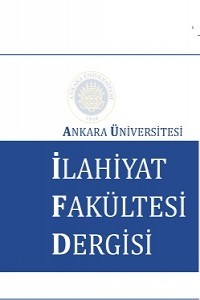Ňěifahi ve YazńĪlńĪ: e - e ńĀlibńę'nin Yetńęmetu'd-Dehr ve Tetimmetu'l-Yetime'sinde kullandńĪńüńĪ kaynaklar √ľzerine bir √ßalńĪŇüma
The oral and the Written: A Study on the Sources of al-Tha ńĀlibńę in his Yatńęmat al-Dahr and Tatimmat al-Yatńęma
___
- Bosworth, Clifford Edmund (tr.). The LaŠĻ≠ńĀ if al- Ma ńĀrif of Tha ńĀlibńę [The Book of Curious and Entertaining Information] . Edinburgh: Edinburgh University Press, 1968 .
- Brockelmann, Carl. Geschichte der arabischen Litteratur. Leiden: Brill, 1943 -9.
- Coulson, N. J. ¬ďEuropean Criticism of Šł§adńęth Literature,¬Ē in A. F. L. Beeston et al. (ed.). Arabic Literature to the End of the Umayyad Period (Cambridge: Cambridge University Press, 1983 ), pp.317 - 321.
- Crone, Patricia. Slaves on Horses: The Evolution of the Islamic Polity. Cambridge; New York: Cambridge University Press, 1980, pp. 7 -15.
- Fleischhammer, Manfred. Die Quellen des KitńĀb al-Ań°ńĀnńę. Wiesbaden: Harrassowitz, 2004.
- F√ľck, Johann. ¬ďDie Rolle des Traditionalismus im Islam,¬Ē Zeitschrift de r Deutschen Morgenl√§ndischen Gesellschaft 93 (1939), pp. 1 -32.
- Gelder, Geert Jan van. ¬ďMuŠł•dathŇęn,¬Ē EI2 Suppl. , pp.637 - 40.
- G√ľnther, Sebastian. ¬ďAssessing the Sources of Classical Arabic Compilations,¬Ē British Journal ofMiddle Eastern Studies 32 (2005), pp.75 -98.
- ---------- . ¬ď¬Ľ¬Önor have I learned it from any book of theirs¬ę AbŇę l-Faraj al-I ŠĻ£ fahńĀnńę: A Medieval Arabic Author at Work,¬Ē in R. Brunner et al. (ed.), Islamstudien ohne Ende: Festschrift f√ľr Werner Ende zum 65. Geburtstag ([Heidelberg]: Deutsche Morgenl√§ndische Gesellschaft, 2000) , pp. 139- 154.
- Kilpatrick, Hilary. Making the Great Book of Songs: Compilation and the Author¬ís Craft in AbŇę l-Faraj al-IŠĻ£ bahńĀnńę¬ís KitńĀb al- AghńĀnńę. London; New York: RoutledgeCurzon, 2003.
- ---------- . ¬ďThe ¬ďGenuine¬Ē Ash ab: The Relativity of Fact and Fiction in Early Adab Texts,¬Ē in Stefen Leder (ed.), Story- telling in the Framework of Non- fictional Arabic Literature (Wiesbaden: Harrassowitz, 1998 ), pp.94- 117.
- Leder, Stefen. ¬ďProsa - Dichtung in der aŠłębńĀr √úberlieferung,¬Ē De r Islam 64 ( 1987 ), pp. 6- 41.
- ---------- . ¬ďThe Literary Use of the Khabar: A Basic Form of Historical Writing,¬Ē in A. Cameron and L. Conrad (ed.), The Byzantine and Early Islamic Near East I: Problems in the Literary Source Material (Princeton: Darwin Press, 1992), pp.277 - 315.
- Motzki, Harald. Origins of Islamic Jurisprudence . Tr. Marion H. Katz. Leiden: Brill, 2002.
- Nöldeke, Th. Geschichte des Qorans , 2nd ed. Hildesheim: Olms, 1961.
- Orfali, Bilal. ¬ď The Art of Anthology: A l-Tha ńĀlibńę and His Yatńęmat al-Dahr,¬Ē Ph.D. Dissertation, Yale University, New Haven, 2009.
- ---------- . ¬ďThe Art of the Muqaddima in the Works of AbŇę ManŠĻ£ Ňęr al- Tha ŅńĀlibńę,¬Ē in Lale Behzadi and Vahid Behmardi (ed.), The Weaving of Words: Approaches to Classical Arabic Prose ( Beirut: Orient-Institut Beirut, 2009), pp.181 - 202.
- ---------- . ¬ďThe Sources of al- Tha ńĀlibńę in Yatńęmat al- Dahr and Tatimmat al- Yatńęma,¬Ē Middle Eastern Literatures 16 (2013), pp.1 -47.
- ---------- . ¬ďThe Works of AbŇę ManŠĻ£ Ňęr al-Tha ńĀlibńę (350-429/961 -1039),¬Ē Journal of Arabic Literature 40 (2009), pp.273 -318.
- Rowson, Everett. ¬ďal-Tha ńĀlibńę, ¬Ē EI2 , v.10, pp.426a -427b.
- Rowson, Everett and Seeger A. Bonebakker. A Computerized Listing of Biographical Data from the Yatńęmat al- Dahr by al-Tha ŅńĀlibńę. Malibu: UNDENA Publications, 1980.
- Schacht, Joseph. The Origins of Muhammadan Jurisprudence . Oxford: Clarendon, 1950.
- Schoeler, Gregor. The Genesis of Literature in Islam: From the Aural to the Read. Tr. Shawkat Toorawa. Edinburgh: Edinburgh University Press, 2009.
- Stetkevych, Suzanne Pinckney. AbŇę TammńĀm and the Poetics of the ŅAbbńĀsid Age Leiden & New York: Brill, 1991.
- Toorawa, Shawkat. Ibn Abńę ŠĻ¨ńĀhir ŠĻ¨ayfŇęr and Arabic Writerly Culture: A Ninth- Century Bookman in Baghdad. London & New York: Routledge Curzon, 2005.
- Werkmeister, Walter. Quellenuntersuchungen zum KitńĀb al- iqd al- farńęd des Andalusiers Ibn Abdrabbih (240/860-328/940). Berlin: Klaus Schwarz Verlag, 1983.
- ISSN: 1301-0522
- YayńĪn AralńĪńüńĪ: 2
- BaŇülangńĪ√ß: 1952
- YayńĪncńĪ: ANKARA √úNńįVERSńįTESńį > ńįLAHńįYAT FAK√úLTESńį
Mustafa KarataŇü. Had√ģs Riv√Ęyet Tarihi
MŇęsńĀ ve HńĪzńĪr KńĪssasńĪ ve KńĪssanńĪn Yahudi K√∂keniyle ńįlgili ńįddialarńĪn Deńüerlendirilmesi
ńįbn SńęnńĀ‚ÄônńĪn Zihin Felsefesinde Eylem S√ľreci
El -BeydavńĪ ŐĄ Tefsirindeki ńį tiz al ńĪ ŐĄ Tesirlerin varlńĪńüńĪ √ľzerine
BatńĪ ToplumlarńĪnda DindarlńĪk ve Cinsel Risk Alma ArasńĪndaki ńįliŇüki √úzerine Bir Derleme
